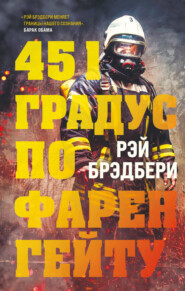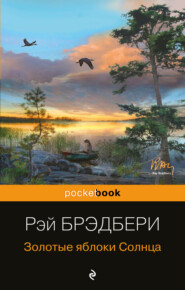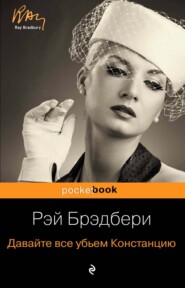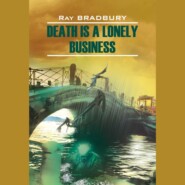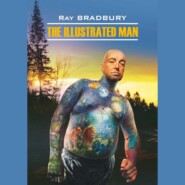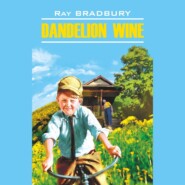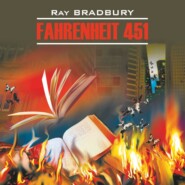По всем вопросам обращайтесь на: info@litportal.ru
(©) 2003-2024.
✖
Golden Apples of the Sun
Автор
Год написания книги
2018
Настройки чтения
Размер шрифта
Высота строк
Поля
An instant later he was on his knees. Every piece, every shard of it, must be found. Fool, fool, fool! he cried to himself, shaking his head and shutting and opening his eyes and bending under the table. Find every piece, idiot, not one fragment of it must be left behind. Fool, fool! He gathered them. Are they all here? He looked at them on the table before him. He looked under the table again and under the chairs and the service bureaus, and found one more piece by match light and started to polish each little fragment as if it were a precious stone. He laid them all out neatly upon the shining polished table.
“A lovely bit of ceramics, Acton. Go ahead—handle it.”
He took out the linen and wiped it and wiped the chairs and tables and doorknobs and windowpanes and ledges and drapes and wiped the floor and found the kitchen, panting, breathing violently, and took off his vest and adjusted his gloves and wiped the glittering chromium.... “I want to show you my house, Acton,” said Huxley. “Come along.... ” And he wiped all the utensils and the silver faucets and the mixing bowls, for now he had forgotten what he had touched and what he had not. Huxley and he had lingered here, in the kitchen, Huxley prideful of its array, covering his nervousness at the presence of a potential killer, perhaps wanting to be near the knives if they were needed. They had idled, touched this, that, something else—there was no remembering what or how much or how many—and he finished the kitchen and came through the hall into the room where Huxley lay.
He cried out.
He had forgotten to wash the fourth wall of the room! And while he was gone the little spiders had popped from the fourth unwashed wall and swarmed over the already clean walls, dirtying them again! On the ceilings, from the chandelier, in the corners, on the floor, a million little whorled webs hung billowing at his scream! Tiny, tiny little webs, no bigger than, ironically, your—finger!
As he watched, the webs were woven over the picture frame, the fruit bowl, the body, the floor. Prints wielded the paper knife, pulled out drawers, touched the table top, touched, touched, touched everything everywhere.
He polished the floor wildly, wildly. He rolled the body over and cried on it while he washed it, and got up and walked over and polished the fruit at the bottom of the bowl. Then he put a chair under the chandelier and got up and polished each little hanging fire of it, shaking it like a crystal tambourine until it tilted bellwise in the air. Then he leaped off the chair and gripped the doorknobs and got up on other chairs and swabbed the walls higher and higher and ran to the kitchen and got a broom and wiped the webs down from the ceiling and polished the bottom fruit of the bowl and washed the body and doorknobs and silverware and found the hall banister and followed the banister upstairs.
Three o’clock! Everywhere, with a fierce, mechanical intensity, clocks ticked! There were twelve rooms downstairs and eight above. He figured the yards and yards of space and time needed. One hundred chairs, six sofas, twenty-seven tables, six radios. And under and on top and behind. He yanked furniture out away from walls and, sobbing, wiped them clean of years-old dust, and staggered and followed the banister up, up the stairs, handling, erasing, rubbing, polishing, because if he left one little print it would reproduce and make a million more!— and the job would have to be done all over again and now it was four o’clock!—and his arms ached and his eyes were swollen and staring and he moved sluggishly about, on strange legs, his head down, his arms moving, swabbing and rubbing, bedroom by bedroom, closet by closet....
They found him at six-thirty that morning.
In the attic.
The entire house was polished to a brilliance. Vases shone like glass stars. Chairs were burnished. Bronzes, brasses, and coppers were all aglint. Floors sparkled. Banisters gleamed.
Everything glittered. Everything shone, everything was bright!
They found him in the attic, polishing the old trunks and the old frames and the old chairs and the old carriages and toys and music boxes and vases and cutlery and rocking horses and dusty Civil War coins. He was half through the attic when the police officer walked up behind him with a gun.
“Done!”
On the way out of the house Acton polished the front doorknob with his handkerchief and slammed it in triumph!
The Flying Machine (#ulink_472fad3d-a00f-5f87-920f-4a942594cbd3)
In the year A.D. 400, the Emperor Yuan held his throne by the Great Wall of China, and the land was green with rain, readying itself toward the harvest, at peace, the people in his dominion neither too happy nor too sad.
Early on the morning of the first day of the first week of the second month of the new year, the Emperor Yuan was sipping tea and fanning himself against a warm breeze when a servant ran across the scarlet and blue garden tiles, calling, “Oh, Emperor, Emperor, a miracle!”
“Yes,” said the Emperor, “the air is sweet this morning.”
“No, no, a miracle!” said the servant, bowing quickly.
“And this tea is good in my mouth, surely that is a miracle.”
“No, no, Your Excellency.”
“Let me guess then—the sun has risen and a new day is upon us. Or the sea is blue. That now is the finest of all miracles.”
“Excellency, a man is flying!”
“What?” The Emperor stopped his fan.
“I saw him in the air, a man flying with wings. I heard a voice call out of the sky, and when I looked up, there he was, a dragon in the heavens with a man in its mouth, a dragon of paper and bamboo, colored like the sun and the grass.”
“It is early,” said the Emperor, “and you have just wakened from a dream.”
“It is early, but I have seen what I have seen! Come, and you will see it too.”
“Sit down with me here,” said the Emperor. “Drink some tea. It must be a strange thing, if it is true, to see a man fly. You must have time to think of it, even as I must have time to prepare myself for the sight.”
They drank tea.
“Please,” said the servant at last, “or he will be gone.”
The Emperor rose thoughtfully. “Now you may show me what you have seen.”
They walked into a garden across a meadow of grass, over a small bridge, through a grove of trees, and up a tiny hill.
“There!” said the servant.
The Emperor looked into the sky.
And in the sky, laughing so high that you could hardly hear him laugh, was a man; and the man was clothed in bright papers and reeds to make wings and a beautiful yellow tail, and he was soaring all about like the largest bird in a universe of birds, like a new dragon in a land of ancient dragons.
The man called down to them from high in the cool winds of morning. “I fly, I fly!”
The servant waved to him. “Yes, yes!”
The Emperor Yuan did not move. Instead he looked at the Great Wall of China now taking shape out of the farthest mist in the green hills, that splendid snake of stones which writhed with majesty across the entire land. That wonderful wall which had protected them for a timeless time from enemy hordes and preserved peace for years without number. He saw the town, nestled to itself by a river and a road and a hill, beginning to waken.
“Tell me,” he said to his servant, “has anyone else seen this flying man?”
“I am the only one, Excellency,” said the servant, smiling at the sky, waving.
The Emperor watched the heavens another minute and then said, “Call him down to me.”
“Ho, come down, come down! The Emperor wishes to see you!” called the servant, hands cupped to his shouting mouth.
The Emperor glanced in all directions while the flying man soared down the morning wind. He saw a farmer, early in his fields, watching the sky, and he noted where the farmer stood.
The flying man alit with a rustle of paper and a creak of bamboo reeds. He came proudly to the Emperor, clumsy in his rig, at last bowing before the old man.
“What have you done?” demanded the Emperor.
“I have flown in the sky, Your Excellency,” replied the man.
“What have you done?” said the Emperor again.
“I have just told you!” cried the flier.
“You have told me nothing at all.” The Emperor reached out a thin hand to touch the pretty paper and the bird-like keel of the apparatus. It smelled cool, of the wind.






